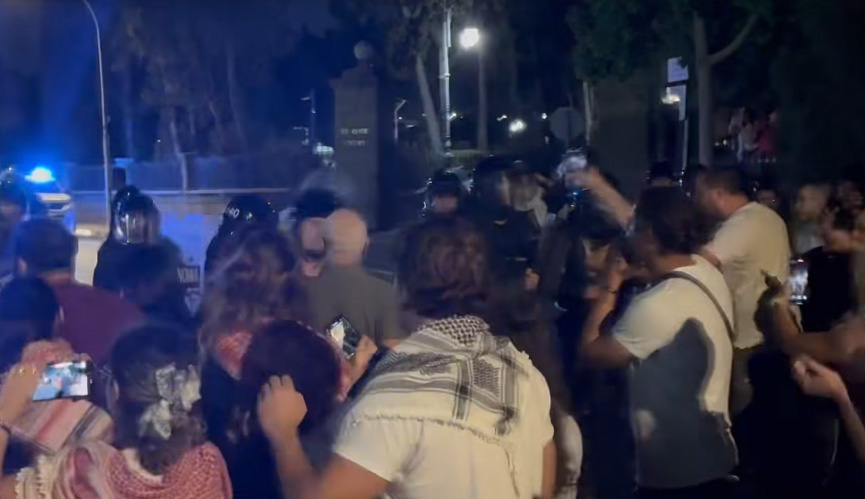Anger brewed on Friday over the police’s heavy-handed response to a protest outside the foreign ministry in response to Israel’s interception of boats sailing towards Gaza as part of the Gaza Sumud flotilla and detention of their crews.
Akel described the police’s response to the protest as an “unprovoked attack” and promised that it “will not go unanswered”, before calling for another protest to be staged at the foreign ministry at 6pm on Friday.
“Akel calls on everyone who does not tolerate state repression and the government’s subservience to the Netanyahu regime to mobilise,” it said.
Volt, meanwhile, said that “violent repression of peaceful demonstrations has no place in a democratic and European country”.
“We condemn the police violence which took place during the peaceful demonstration … in Nicosia. The demonstration was about violations of international law and the illegal military operation being carried out by the Israeli army against the peaceful civilian boats heading to Gaza with food and medicine for the Palestinians,” it said.
It added, “we cannot allow a return to authoritarianism, nor violence against citizens of the Republic of Cyprus who are demonstrating peacefully simply to appease third parties”.
The Green party, meanwhile, said it “unequivocally condemns the use of force and pepper spray which appears to have been used by the police” at the protest.
“While images of the peaceful demonstrations to intercept the flotilla were circulating online around the world, in Cyprus, the security forces chose … violent repression. The right to peaceful assembly is a cornerstone of every democratic system and is what distinguishes it from other regimes,” it said.
“Democracy is only protected when people can express themselves and assemble freely.”
Protesters on Thursday night were met with riot police, who deployed pepper spray after becoming involved in physical tussles with them.
A journalist from newspaper Haravgi said she was among those “hit” by the police, while the newspaper said riot police used shields to push a group of demonstrators back.
Meanwhile, veteran journalist and activist Christos Christofides said he was “thrown to the ground by the unprovoked attack by the police”.
“I thank those who rushed to help me get up before I was trampled by the chaos that prevailed. It is noteworthy that the police team that carried out the attack arrived at the scene after the television channels had left,” he said.
On Friday morning, the union of Cyprus journalists also declared that “the use of force against a journalist in the performance of her duties by the police … is unacceptable and worthy of condemnation”.
It added that the journalist had “indicated her status as a journalist four times”, but said that “despite all this, the police officers continued to use force against her, pushing her and throwing her to the ground twice, while she was also pepper sprayed in the face”.
It also demanded that police chief Themistos Arnaoutis order an investigation into the matter, and said, “the errant police officers must be punished in an exemplary manner”.
“Journalists in a democratic state governed by the ruled of law must be able to carry out their work and mission without hindrance and obstruction,” it said.
The police said the trouble began when a group of demonstrators blocked one lane of the road outside the foreign ministry, and that they had moved in to clear the road.
The protest in Nicosia was a part of wider global protests in response to the interception of flotilla boats and the detention of the crews, with thousands of people taking to the streets in Barcelona, Milan, Dublin, Paris, Berlin, and Geneva, while protests also took place in Istanbul, Buenos Aires, Mexico City, and Karachi.






Click here to change your cookie preferences